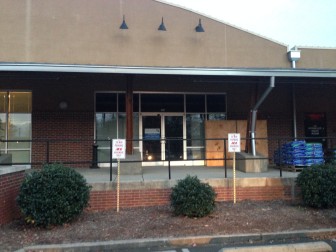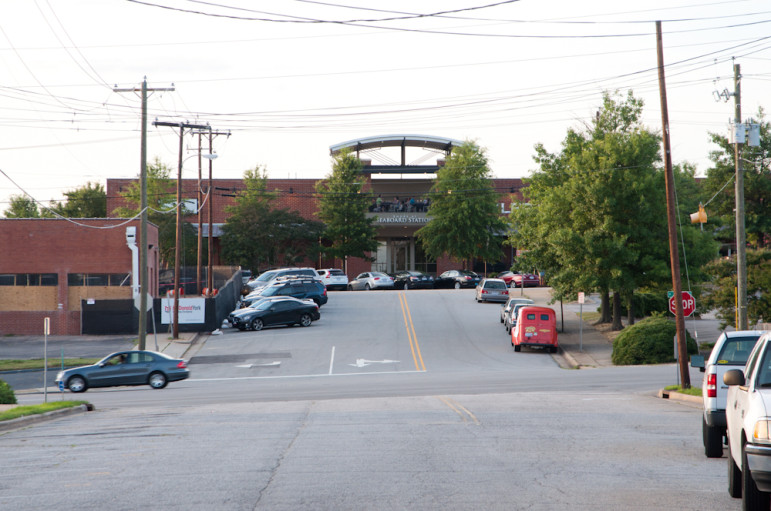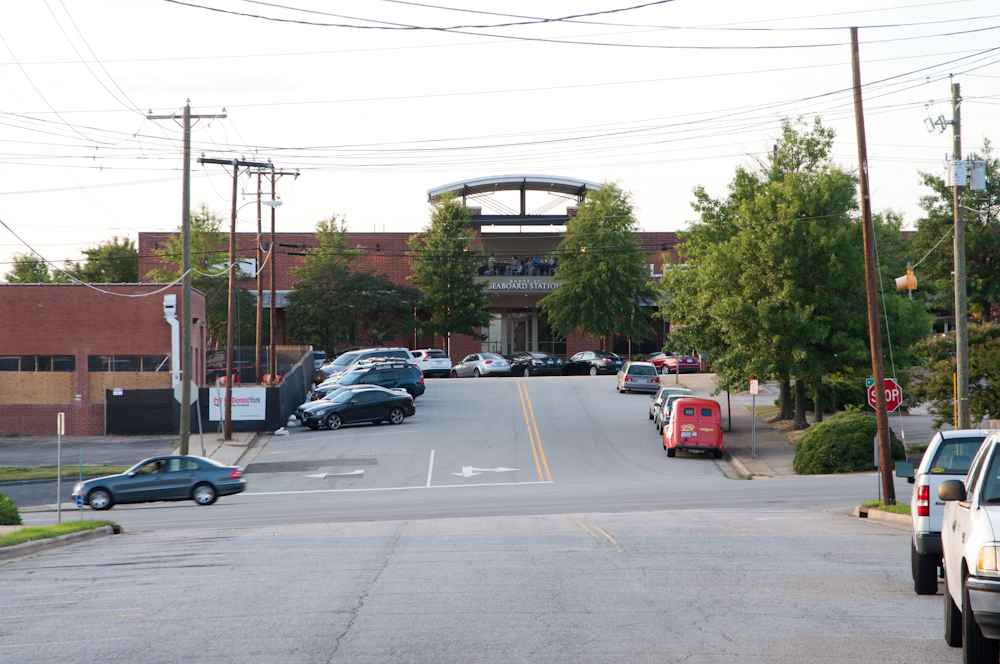Although Peace University completed its $20.75 million acquisition of Seaboard Station in late October, there will be no significant changes coming to the downtown retail hub anytime soon.
Billie Redmond, CEO of Trademark Properties, which is handling the leasing and management of Seaboard for Peace, said the main goal right now is to focus on rebranding and increasing exposure and awareness of the property.
“Seaboard is a jewel in downtown Raleigh,” Redmond said. “It represents some of the biggest collection of retail space, and you’ve got this really nice feel of neighborhood retail.
“Part of the challenge in the last couple of years with the bankruptcy and everything is that there just wasn’t much awareness, so our task is to make sure everyone knows where Seaboard is and what it is.”
Peace University was able to purchase the retail center after it was put up as collateral by its former owner, Gregory & Parker, in its bankruptcy filings in February of 2012.
While there was initially some uncertainty about the University’s plans for the space and whether existing retailers would be able to remain in their current locations, Redmond said the majority of the tenants have leases that extend five years with multiple options to renew.
“As long as the tenants pay their rent, and the landlord does what it’s supposed to do, everybody should still be there,” she said.
Kim Gazella, co-chair of the Mordecai Citizens Advisory Council, said many of the residents in the surrounding neighborhood initially viewed Peace’s plans to purchase Seaboard with skepticism and apprehension. At the time, there were concerns that the space might be used simply to annex the University’s campus instead of allowing it to remaining in its current form.

James Borden / Raleigh Public Record
“We just want to ensure that Seaboard remains a viable shopping center the way that it is now, because that’s what the community cares a lot about,” she said.
“That’s what the neighborhood likes about Seaboard, is the kind of shops that we have over there.”
After a few public meetings with Trademark, Gazella said she is confident they share a common goal in maintaining the quality Seaboard has become known for in the past few years.
Rick Perales, the owner of the Seaboard Café inside of Logan’s Trading Company, said many of the business owners had shared the neighbors’ initial fears regarding the Peace takeover.
“There was a lot of distrust from people with the [University’s] administration,” he said.
After talking with some officials from Peace, however, Perales said many of those concerns were laid to rest.
“Their ideas about the newly acquired property is that they’re going to be building up, and not taking away the retail spaces,” he said.
Perales said he is glad for the change in ownership.
“As far as Peace College coming down here acquiring the property, I like them better than the old landlords – they were brutal, they were not even nice to their tenants,” he said, adding that one of his customers was once towed for parking in an unused portion of the parking lot.

Leo Suarez / Raleigh Public Record
A Downtown Hub
As part of its efforts to expand awareness of and interest in the property, Redmond said they have met with the Downtown Raleigh Alliance in order to better incorporate Seaboard into future downtown event planning.
Seaboard, Redmond said, is “the anchor of the Northern Capital district, and when you think about downtown, you’ve got Glenwood South and the Warehouse District and now you’ve got Seaboard, and I think we can be a much more active participant in the bigger downtown activities.”
She also cited a recent open house, held at Logan’s Nov. 13, and events scheduled for December, including a family night at Logan’s Dec. 14, as part of their efforts to drive more traffic to the retail center.
“We’re working with some other local charities to come and do some things at Seaboard, and the more people that come the more that will be drawn into other things,” Redmond said.
Gazella said many in the neighborhood would welcome more events at Seaboard, citing the success of ones held in the past, including Music on the Porch and Oktoberfest.
Redmond said in the coming year they hope to use the field in back of Seaboard to host events such as food truck rodeos as another way of driving traffic to the center.
“We have something a lot of people don’t have – a parking lot and a green field in the back of the shopping center, and we’re hoping to work on a solid event calendar that brings Seaboard to a higher level of participation and awareness for the people around it,” she said.
Future Plans
Redmond said the center is leased at 95 percent capacity. While Trademark has had a lot of interest from potential tenants, she said they have decided to take their time and make any future decisions based on what would be the best fit for existing tenants.
“Our goal is to maximize the return and value that [Peace] has invested in the property, and we want to drive more traffic for the other tenants in the area – the more successful they are, the more successful the center will be,” she said.
Redmond said Trademark has held recent meetings with neighborhood leadership to gauge interest in what kind of shops may do well at the center.
Among the feedback they received, she said, was the desire for a coffee shop and a continued focus on women’s services and retail shops. While Brew, a coffee bar scheduled to open in the spring of 2014 at the nearby 111 Seaboard, managed by York Properties, may diminish the chances of Trademark seeking out a similar tenant, Redmond said the success of both Galatea, a clothing boutique, and Marigould Parlour, a hair and makeup salon, certainly leaves the door open for similar shops to open at Seaboard in the coming years.
Although the previous owner, Gregory & Parker, had at one point made tentative plans to develop an apartment complex on the parking and green space in the back of the property, Justin Roy, the interim vice president for Enrollment and Marketing at Peace University, said that although the University acquired that land as part of its purchase, there are no current plans to for building any kind of housing complex.
Gazella said in recent community meetings that they had been told the apartment and condo market for the area is currently saturated, due to the new developments at Cameron Village and on Hillsborough Street, and that there was little likelihood of any new multi-family developments springing up at Seaboard.
Doug Diesing, owner of Seaboard Wines, has been a tenant at Seaboard for 28 years, 17 of those with the wine shop. Prior to that, he said, he was leasing space for a warehouse for his former business, Simple Pleasures, a specialty food and wine shop.
Since the Peace acquisition, he said it’s mostly been “business as usual” although he does imagine there will be some turnover in the coming years. As far as future tenants, Diesing said “The neighborhood still wants a food store in Seaboard Station, not a low-end grocery store like Capital City Grocery, but something along the lines of, nice take out food, fresh baked bread – that’s what this center really needs. We’d love to have something like that here.”
Capital City Grocery opened at Seaboard in 2007, then closed and briefly re-opened in 2008 before closing its doors for good.
Perales agreed with Diesing’s assertion that a grocery store would be well received, but said that it would likely require “deep pockets” for anyone coming in, due to the limited space the store would have to operate in and the competition from Harris Teeter and Fresh Market at nearby Cameron Village.
Perales said even when new tenants come in that may compete with his own business, including in recent years Tyler’s Taproom and Fat Daddy Burgers, the only real problem is an increased competition for parking spaces.
“It’s healthy,” he said. “I’ve been here for 22 years and for me it just had to make me think about what I’m doing again.”
“I’m really comfortable sitting on my laurels, you know?”
Perales said he’s been pleased with the way everything has been handled so far, and is anticipating the best for the future as well.
“I’m really happy that everything is turning out the way it is, but I hate change buddy, you can’t stop it, so either you embrace it or you live in misery.”
Minor Improvements
While Redmond said the center is currently in pretty good physical condition, there are plans to make some general improvements to the landscaping, signage and parking lot scheduled for next spring.
Although representatives from Peace University largely declined to comment on specific details of the purchase or future plans for the property, referring all questions to Trademark Properties, Redmond said they have been working on real estate acquisition projects with the university for a while, and that Seaboard is a good example of the kind of long-term investment that more and more universities are moving toward.
“There are some who run very long-term projections, and they’re very protective of their campuses and the safety of their students, and with [investments like Seaboard] they have a voice about what’s going on around them,” she said.
